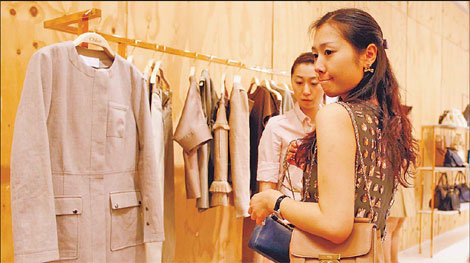Economy
Boost for Chinese fashion brands
By Li Woke (China Daily)
Updated: 2011-05-23 09:06
 |
Large Medium Small |
 Shoppers looking at clothing and accessories at a Chloe shop in Shanghai. Chloe, the French fashion label owned by Cie Financiere Richemont SA, aims to add four stores in China this year in competition with its business rivals to win the trust of Chinese consumers, said Chief Executive Officer Geoffroy De La Bourdonnaye. [Photo / Agencies] |
BEIJING - Bustling Xidan Street in downtown Beijing is home to dozens of clothing stores, featuring both foreign and domestic labels.
It is also testimony to the growing popularity of domestic brands. Not only are Zara and H&M full of chic teenagers, but so, too, are their Chinese competitor, MetersBonwe.
Furthermore, PYE, JNBY, Ochirly, Septwolves, Lilanz and Cabeen have all witnessed growth in sales over the past few years.
Chinese online apparel brand VANCL has been imitating H&M's marketing strategies, putting eye-catching low prices on their T-shirts, pants, and canvas shoes.
Li Ning, the final torchbearer during the opening ceremony of the 2008 Beijing Olympics and former gymnastics gold medallist, has also seen tremendous growth in his namesake company, Li-Ning Co Ltd.
|
||||
Li-Ning first entered the US market in 2007 by setting up a research and development center and design studio in Portland, Oregon. Among its staff are at least 30 veterans of companies such as Nike, Adidas, Converse and Columbia.
Li-Ning's products sold in the US include equipment and apparel for Asian-dominated sports such as ping-pong and badminton, niche areas in which Li-Ning is an established leader.
Other Chinese rivals to the likes of Nike and Adidas are Peak and Anta, which are both listed on the Hong Kong stock market and have successfully sponsored the US National Basketball Association (NBA).
Analysts predict China's sportswear market will grow from an estimated $7.2 billion in 2009 to around $12.4 billion in 2012.
"Privately-owned garment enterprises, compared with their overseas rivals, have the advantages of modern equipment and greater flexibility in product type, distribution channels and types of incentive systems," said Chen Chong, a retail analyst with Founders Security.
| 分享按鈕 |



